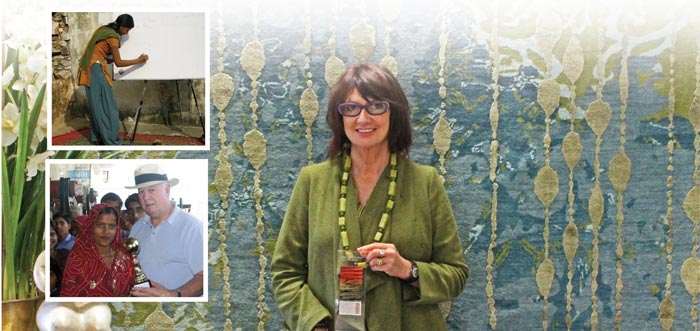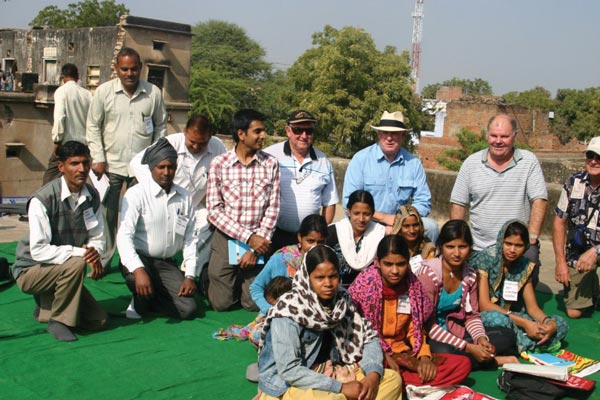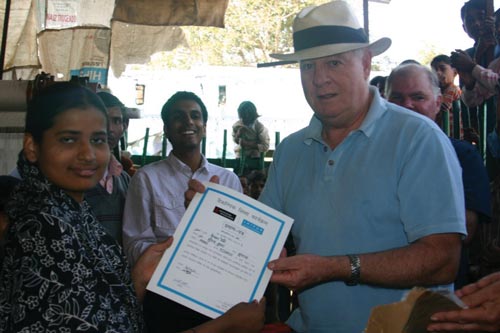Jenny & Dennis Jones offer advice to fellow retailers based on their experience helping rug weavers in India through the Alternative Education Program.
Interview with Jenny Jones
Editor’s note: This is the second in a series of articles that profile furniture industry charitable initiatives. Its purpose is to provide models for furniture retailers who have an interest in supporting existing programs, or in launching meaningful charitable initiatives of their own.
Our interview with Australian retailer and designer Jenny Jones followed the introduction by Jaipur Rugs of ‘Connextion by Jenny Jones’ at the recent High Point Market. Jenny is donating her US royalties from the collection to benefit the Jenny Jones Trust, an organization charged with promoting women weavers’ literacy, numeracy and life skills in rural India. This program works in conjunction with the Alternative Education Program, sponsored by the Jaipur Rugs Foundation.

Jenny Jones and her husband Dennis are the owners of retailer Jenny Jones Rugs & Home based in Perth, Australia. Furniture World Magazine spoke to Jenny about how AEP got started, and why the decision was made to create a charity that supports people who live well beyond her store’s local trading area.
Question: Most retailers do business locally and like to support local charities that resonate with their customers. Why did you look beyond your own retail operation and customer base?
Answer:
We also support a number of local charities, however, being involved in purchasing rugs from India which is a big part of our business, we felt that there was a need to give back.
We don’t think there is a downside to supporting international causes as the dollar goes so much further in the less developed world.
Question:
How did your program begin and evolve?
Answer:
We travelled to India for a number of years seeking a company that we felt comfortable working with for the betterment of the weavers. Our discussions with industry workers in the rural areas of Rajastan led us to Jaipur Rugs. The Alternative Education Program (AEP) evolved after we approached Jaipur Rugs about ways in which we "could put back" into the industry that provides us with our livelihood, giving us the opportunity to purchase beautiful hand made rugs that really are "individual pieces of art on the floor".
From these initial discussions, it soon became evident that the vehicle to use was the Jaipur Rugs Foundation (JRF) as established by Mr. N.K. Chaudhary. Discussions continued, and we put our efforts behind the AEP as a worthwhile and cost effective way to deliver important life skills to the female weaving population. A Project manager was appointed and a budget drawn up with regular evaluation procedures and reports. Village teachers were trained and villages selected to participate. Modules of 25 weavers were offered the opportunity to receive literacy, numeracy and life skills. The project was launched at the beginning of Jan 2011 and after 6 months evaluated.
 Question:
Question:
What motivated you to begin this project?
Answer:
In India it is estimated that some 350 million people are illiterate. A nice round figure that rolls off the tongue if said quickly! In one way, it is a meaningless and daunting figure, but in another it shows the enormity of the need to make a start working for change. The majority of these people are women living in rural villages, who were never offered the opportunity to go to school.
So, our motivation centered on the premise that weavers are artisans. By recognizing that fact, we concluded that it is important to give them increased status and opportunity so that they can fully participate in what we regard as a basic human right. It was thought that an educational program would also motivate them to stay in their villages and continue their work as weavers.
Question:
What was the process you went through?
Answer:
The process involved a good deal of research that was undertaken by JRF. We all felt that the request for any program had to come from the grassroots up, otherwise it would be of no benefit to the weavers at the village level. I travelled into the village areas and met weavers to gauge their response to our offer. The response was overwhelming, although most displayed a degree of skepticism given that assistance is often offered but then not delivered to the village level.
It must be said that the rural areas of Rajastan have a beauty that is dotted with village clusters, truly calm, peaceful and naturally beautiful with the slow gait of the camel and the prolific bird life. Pollution free and rich soils compliment the scene.
 Question:
Question:
Why did you set up your own program rather than supporting an existing organization?
Answer:
Mainly because we wanted to control and monitor the program. Jaipur Rugs had already set up its own charity that was the best vehicle to use to deliver the program. They already had an established network of 40,000 weavers spread over Northern India. So, logistics channels were in place and the AEP could piggyback on this extensive network.
Question:
What kind of resources, talent and organizational structure were required?
Answer:
Human resources and financial resources need to combine effectively to ensure accurate delivery of a program such as ours. We have three partners who all contribute equal funds. The program is delivered through an audited foundation, which in turn, has a formal structure. All partners receive quarterly updates on expenditures and delivery of services. It is extremely important that the process be formally structured to allow for total transparency. It also should be said that the greater the partners in the project involve themselves in a "hands-on" mode, the greater the rewards, and the closer they get to see the project in action. The partners visit the project annually and travel into the rural areas to meet and greet the graduates of the AEP in their villages. Prize ceremonies are held to reward those weavers who have topped their class. We also award prizes to the top village teachers.
 Question:
Question:
What are your suggestions for retailers that choose not to create their own charity?
Answer:
They can join an existing program like ours or select an established registered charity that works in the less developed world. The charity they choose should maximize its resources to ensure that the greatest percentage of the donated dollar reaches its intended target. They should be independently audited. Every dollar can change a life! There is nothing more rewarding than seeing a lady weaver gain so much self esteem and sense of achievement when she gets up in front of her peer group and reads aloud to them. Beaming smiles and lots of laughter ripple out across the village from the classroom. It’s priceless!
For example, other furniture retailers can join our program by either donating directly or by taking ownership of a village. A retailer might commit to helping 25 weavers for $30 each. This would give them a direct involvement in improving and changing lives. It would also ensure that the supporting retail organization gets feedback and maintains contact with a village in rural India. Individual retailers can also speak to our partner Jaipur Rugs to ensure that a certain agreed sum is directed to the AEP as a result of their purchase of Jenny Jones Connextion rugs. Our hope is to get the ball rolling with a substantial cash injection by funding the education of one weaver for every rug purchased.
Question:
Please list pitfalls that Furniture World Magazine readers should try to avoid.
Answer:
Lack of research, lack of accountability, budget transparency, lack of trained staff. Our family spent 4 years in Africa on aid programs in the 1980s and 1990s and witnessed how a number of charities delivered services to local populations. Many were successful and well run but others were not. So, due diligence is vital.
Ask questions and demand answers. Ask for testimonials. It’s the percentage of the donated dollar that reaches the grassroots that is a most important criteria.
Question:
Do you have any other advice for our readers?
Answer:
Get involved! It’s a most rewarding experience, although it’s a world away from your everyday life. Furniture stores and specialty rug retailers that get involved in a program like this are actually giving back to the industry that provides their livelihood. The number of weavers involved in the handmade rug industry is declining rapidly in India. This is due to government work programs and the movement of people from rural areas to the cities. Women are the backbone of village family life. Anything that encourages weavers to stay in their villages, gain respect and elevated status as artisans should be a priority and strongly encouraged.
One further initiative we are exploring is the provision of small affordable cost effective solar lanterns that will provide lighting in rural villages. Electricity is turned off at night in rural India and this is evident when you travel at night and look into the distance - it is pitch black! We want to reward the female weavers with lights that the Ikea Foundation provides on a one to one donation. They cost $20 each and the batteries last 2 years. These lanterns will also enable weavers to work at night in the heat of summer if so desired. I have personally tested them and they work very well. We are putting out a proposal to Ikea.
Questions about this program can be directed to
editor@furninfo.com.
Russell Bienenstock is Editor-in-Chief of Furniture World Magazine, founded 1870. Comments can be directed to him at editor@furninfo.com.